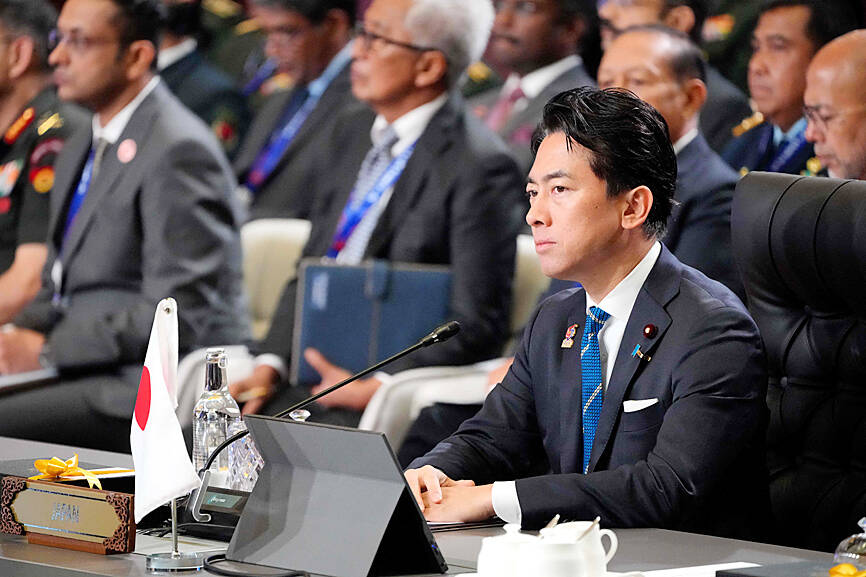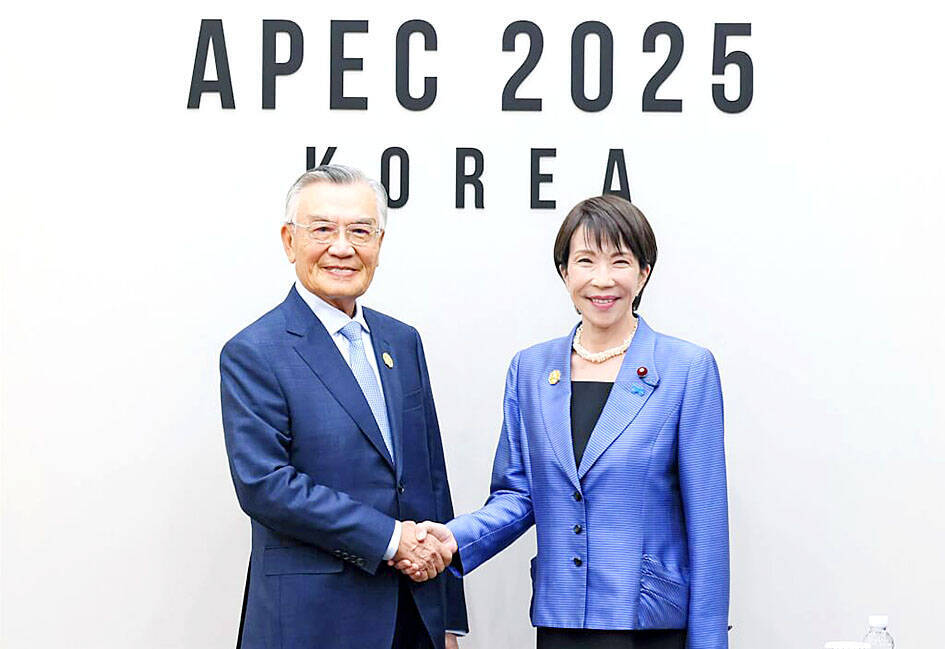Minister of Foreign Affairs Lin Chia-lung (林佳龍) yesterday thanked Japanese Minister of Defense Shinjiro Koizumi for emphasizing the importance of safeguarding peace and stability in the Taiwan Strait during Koizumi’s meeting with Chinese Minister of National Defense Dong Jun (董軍).
Koizumi made the remarks when he met with Dong at the 12th ASEAN Defense Ministers’ Meeting-Plus (ADMM-Plus), ASEAN’s defense platform, during his visit to Malaysia.
In the meeting, Koizumi said that among the various aspects of Japan-China relations, the security field remains the most challenging area.

Photo: AFP
He expressed Japan’s serious concern over Beijing’s increasing military activities in the East China Sea and the Pacific region.
He also reiterated concern about China’s military activities around Japan, including those conducted jointly with Russia, and the situation in the South China Sea, as he emphasized the significance of peace and stability across the Taiwan Strait.
The Ministry of Foreign Affairs in a news release said that peace and stability across the Taiwan Strait is of shared interest to the international community, and indispensable to the world’s prosperity and security.

Photo grab from x.com/takaichi_sanae
As authoritarianism expands, constantly challenging the rules-based world order and intensifying tensions, Taiwan continues to strengthen its self-defense capabilities and whole-of-society resilience, the ministry said.
Taipei would continue to work with democratic allies to promote peace, stability and prosperity in the Indo-Pacific region, it added.
Meanwhile, the ministry yesterday also responded to China’s protests to Tokyo about a meeting between Japanese Prime Minister Sanae Takaichi and presidential adviser Lin Hsin-i (林信義), Taiwan’s envoy to this year’s APEC Economic Leaders’ Meeting.
Takaichi wrote on social media that she had met with Lin on Friday and Saturday.
Tokyo is looking forward to deepening cooperation between Taiwan and Japan, she said.
The Chinese Ministry of Foreign Affairs in a statement on Saturday criticized Takaichi for meeting with Lin on the sidelines of the APEC summit and posting on social media about the discussions.
“Those actions are egregious in nature and impact,” it said. “China expresses its firm opposition and has made serious demarches and protests to Japan.”
The Ministry of Foreign Affairs said that it was natural for Taiwan, as a formal member of APEC, to engage in exchanges with other member states.
Lin engaged in exchanges with the leaders or representatives of more than 10 economies, including Takaichi and US Secretary of the Treasury Scott Bessent, during the summit, the ministry said.
The ministry reiterated that the Republic of China is a sovereign and independent country and it is not subordinate to the People’s Republic of China (PRC).
The PRC has never governed Taiwan, which is a fact and the “status quo” acknowledged by the international community, it said, adding that Beijing has no right to comment on and interfere in the sovereign actions of other nations.
China’s criticism about the interactions between Taiwan and Japan based on the so-called “one China principle” has violated the core principle of equal participation for all APEC members, it said.
Taiwan and Japan, as important partners and friends, share universal values such as freedom, democracy, human rights and rule of law, the ministry said.
Taiwan is to continue to deepen cooperation with Japan on the solid foundation of their bilateral relations to jointly safeguard peace, stability and prosperity in the Indo-Pacific region, it said.
Additional reporting by Bloomberg

A Ministry of Foreign Affairs official yesterday said that a delegation that visited China for an APEC meeting did not receive any kind of treatment that downgraded Taiwan’s sovereignty. Department of International Organizations Director-General Jonathan Sun (孫儉元) said that he and a group of ministry officials visited Shenzhen, China, to attend the APEC Informal Senior Officials’ Meeting last month. The trip went “smoothly and safely” for all Taiwanese delegates, as the Chinese side arranged the trip in accordance with long-standing practices, Sun said at the ministry’s weekly briefing. The Taiwanese group did not encounter any political suppression, he said. Sun made the remarks when

The Taiwanese passport ranked 33rd in a global listing of passports by convenience this month, rising three places from last month’s ranking, but matching its position in January last year. The Henley Passport Index, an international ranking of passports by the number of designations its holder can travel to without a visa, showed that the Taiwan passport enables holders to travel to 139 countries and territories without a visa. Singapore’s passport was ranked the most powerful with visa-free access to 192 destinations out of 227, according to the index published on Tuesday by UK-based migration investment consultancy firm Henley and Partners. Japan’s and

BROAD AGREEMENT: The two are nearing a trade deal to reduce Taiwan’s tariff to 15% and a commitment for TSMC to build five more fabs, a ‘New York Times’ report said Taiwan and the US have reached a broad consensus on a trade deal, the Executive Yuan’s Office of Trade Negotiations said yesterday, after a report said that Washington is set to reduce Taiwan’s tariff rate to 15 percent. The New York Times on Monday reported that the two nations are nearing a trade deal to reduce Taiwan’s tariff rate to 15 percent and commit Taiwan Semiconductor Manufacturing Co (TSMC, 台積電) to building at least five more facilities in the US. “The agreement, which has been under negotiation for months, is being legally scrubbed and could be announced this month,” the paper said,

MIXED SOURCING: While Taiwan is expanding domestic production, it also sources munitions overseas, as some, like M855 rounds, are cheaper than locally made ones Taiwan and the US plan to jointly produce 155mm artillery shells, as the munition is in high demand due to the Ukraine-Russia war and should be useful in Taiwan’s self-defense, Armaments Bureau Director-General Lieutenant General Lin Wen-hsiang (林文祥) told lawmakers in Taipei yesterday. Lin was responding to questions about Taiwan’s partnership with allies in producing munitions at a meeting of the legislature’s Foreign Affairs and National Defense Committee. Given the intense demand for 155mm artillery shells in Ukraine’s defense against the Russian invasion, and in light of Taiwan’s own defensive needs, Taipei and Washington plan to jointly produce 155mm shells, said Lin,